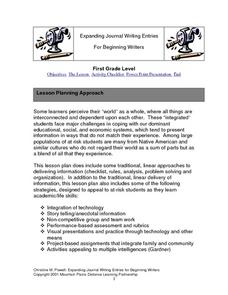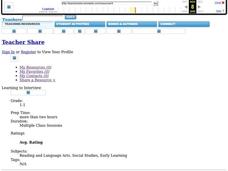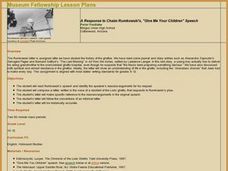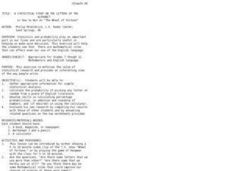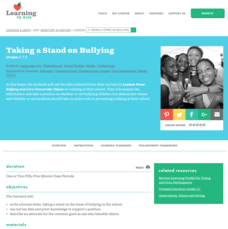Curated OER
Redistricting: Drawing the Lines
Difficult redistricting concepts are covered in a context that will make it understandable to your government scholars. They begin with a KWL on the term redistricting and then watch a video to answer some questions. They...
Curated OER
Classifying Information About a Main Idea
Elementary learners explore language arts by completing a text identification activity. They discuss the importance of a main idea in a story or paper and how to present it properly. Then they practice identifying the main idea in sample...
Curated OER
Expanding Journal Writing Entries For Beginning Writers
First graders through a variety of strategies assess how to write in journals openly and effectively. Those strategies include integration of technology, story telling, group and team work, performance-based assessment/rubrics, visual...
Curated OER
Food Labels in the Classroom
Students study the nutritional information on food labels and become familiar with the basic dietary needs of the human body. They write letters to food companies.
Balanced Assessment
Presidential Popularity
Media often misrepresent data and statistics to their advantage. This lesson asks scholars to analyze an article with misleading statistics. They use margin of error and mean data in their studies. Once they complete their analysis,...
Curated OER
Working with Business Letters
Students practice with business letters. They identify main ideas and supporting details.
Curated OER
Pay to Play?
Lead your class in a discussion about how they believe money influences politics. After reading "Go Ahead, Try to Stop K Street" from the New York Times, they evaluate the claims in the article about the current lobbyist scandal in...
US National Archives
Eastern Europe 1939-45 — Camps
Britain's decision not to bomb German death camps in World War II has provided many questions for historians, but with a primary source analysis lesson, high school students may be a step closer to finding out the truth. Learners read...
Curated OER
Rock Swap
Students collect rocks found locally and write a brief description which includes the name of the rock, whether the rock is sedimentary, metamorphic, or igneous, and what uses the rock has. They exchange rocks with another class in...
Curated OER
Learning to Interview
An authentic and engaging way to practice literacy skills, this lesson calls for young language arts pupils to conduct interviews with classmates and family members. First, pupils watch as the teacher models the interview process with a...
Curated OER
Beary O'Mometer Learns About Careers In Meteorology
Students explore the field of meteorology. In this meteorology lesson, students explore weather-related careers as they research the field of study as well as various weather concepts. Students interview meteorologists, write business...
Curated OER
A Sample of What?
Students are introduced to the connection between women and the textile industry. Using primary source documents, they complete a handout on how gender roles have changed over the years. They examine a sampler which is connected to the...
Curated OER
Writing an Effective Resume
Rating prospective teacher candidates based on sample resumes opens this discussion of effective business communication. After generating a list of interview candidates based on their resumes, pupils justify their choices. A study of...
Roy Rosenzweig Center for History and New Media
Differences Among Colonial Regions
Classes look at and analyze primary source images to explore the differences between the colonial regions during the Revolutionary era. They break into groups to tackle each region and then present their findings to the class. A final...
Curated OER
A Response to Chaim Rumkowski's, "Give Me Your Children" Speech
Students examine the history of the ghettos and read Rumkowski's letter. Using journal and diary entries, they identify types of resistance used during the Holocaust. Writing a letter, they use references to Rumkowski's original letter...
Curated OER
The Dirt on Worms!
Fourth graders make predictions, observe, collect and record data. They investigate several soil and worm websites. Finally, 4th graders write a letter to The President which defends earthworms by explaining their value to the United...
Curated OER
Am I Seeing Double?
Students explore symmetrical design and lines of symmetry. In this fourth grade geometry lesson, students create their own symmetrical design and identify and label the lines of symmetry. Students use one design to create a...
Curated OER
Where the Buffalo Roam
Students lear about energy, energy efficiency and consumption. They measure energy use, graph the date, write a letter then design and present a PowerPoint on the topic.
Curated OER
"my Dear Little Boys..." Using Wwii Primary Documents: a Letter Home From the War
Learners read letters written by soldiers during World War II in order to analyze the soldier's feelings about the war. They explain how these primary sources teach appreciation for the World War II soldier's experiences.
Curated OER
A Statistical Study on the Letters of the Alphabet
Students use a book or magazine to research the use of letters. They complete a worksheet and compare their results.
Curated OER
Dragonwings: Evaluate Chapters 10-12
As your class finishes the novel Dragonwings, use these culminating projects. A vocabulary list is given for chapters eleven and twelve and either an epitaph or letter activity concludes the book. The final project consists of creating a...
Curated OER
Taking a Stand on Bullying
Middle schoolers stand up against bullying in a character-building lesson. After discussing historical figures who became advocates in times of adversity, they brainstorm ways to end bullying at their own school, and use a formal letter...
Curated OER
Tree Hunt
Students identify the common trees of Iowa and make observations while creating a key. In this tree hunt lesson, students write a letter to the Iowa Department of Natural Resources to receive a pamphlet of Common Trees of Iowa. Students...
Curated OER
China CultureQuest
Pupils use the internet and other tools to examine the culture of China. In groups, they brainstorm a list of topics they want to know more about and practice writing Chinese letters. They create a collage to show the class what...


